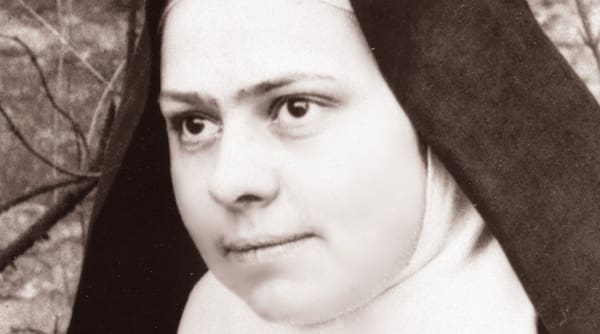In the first part of this post, we talked about silent adoration and the movement of prayer that is an ecstasy of love. Today, we will discuss how adoration is a symphony of love and how silent adoration leads to a life filled with love.
 If we consider adoration as a going out of self, we better understand what Elisabeth of the Trinity intends to convey when she attributes adoration to the inner life of the Trinity. In the bosom of the Trinity, that is in the very communion of the Father, Son and Holy Spirit, Elisabeth ‘hears’ adoration as a song of praise.
If we consider adoration as a going out of self, we better understand what Elisabeth of the Trinity intends to convey when she attributes adoration to the inner life of the Trinity. In the bosom of the Trinity, that is in the very communion of the Father, Son and Holy Spirit, Elisabeth ‘hears’ adoration as a song of praise.
Notice that her vision of heaven is not something static or boring. I think anyone who actually believes God is like that will never learn to pray. Why should anyone pray if in the end we wind up with something lifeless? In us, there is a passion to thrive that rebels against the temptation of nihilism. Even under the shadow of the certainty of death, we do not want to perish, but to live. This passion was put there by God himself. God is himself the thriving happiness which is the source of all beatitude. He is so filled with life and love that only those with great passion can find Him. And yet He yearns for us to find Him and in Him to realize the perfection of all our noble human potential. We are talking about the total freedom to love – to give oneself to God and others in a communion of unending love. To live like this is completely opposed to anything boring or static.
Heaven is a place where nothing inhibits love. And we all know our finest moments in life are precisely those moments when we love without counting the cost, when we give everything for the sake of the beloved – whether a spouse, a child, a stranger or God. These moments of strength, courage and freedom are such gifts. They allow us to glimpse who we really are. Imagine yourself in your finest moment — only this time the moment never ends. It is with this kind of love the Jesus adores the Father from all eternity — it has all the force and power of great music, or rather, this is the source of all music. Flowing from the heart of the Trinity, Elisabeth ‘hears’ a symphony of love in which our own silent adoration somehow participates. Elisabeth understands this graced participation as Christ adoring the Father within us through our faith in Him.
Perhaps the most beautiful attempt to express this idea is contained in the writings of St. John of the Cross. Especially in Living Flame, the Spanish mystic describes an intimate experience of God in terms of “Lamps of Fire” (LF 3). Those who fully enter into the prayer of adoration discover that their journey into God has allowed God to journey into them – that is, has allowed God to be present in new ways. The warmth and light of God permeates their every action – this to such an extent that their very presence strengthens and enlightens those around them. Elisabeth would say that even in their weakest and most human moments, the Lord’s eternal resounds through them.
of the Cross. Especially in Living Flame, the Spanish mystic describes an intimate experience of God in terms of “Lamps of Fire” (LF 3). Those who fully enter into the prayer of adoration discover that their journey into God has allowed God to journey into them – that is, has allowed God to be present in new ways. The warmth and light of God permeates their every action – this to such an extent that their very presence strengthens and enlightens those around them. Elisabeth would say that even in their weakest and most human moments, the Lord’s eternal resounds through them.
How does silent adoration lead to a life filled with such love? Elisabeth and John of the Cross speak about a humble loving acceptance of persecutions, tribulations, nights, dryness, and other tests. By having the courage to continue to adore in the midst these great trials, joining his song of praise in those crucifying moments of our lives, we learn the secret of gazing on the face of Christ crucified by love. This allows us to be completely surrendered to God, because keeping our eyes fixed on Him, nothing can overwhelm us but His infinite love. And so the reason we come to yearn for adoring silence: when we catch, even for an instant, the look of love in his eyes, that powerful yearning for our happiness, nothing can separate us from Him and his warmth and light in us becomes, even in the most bitter cold darkness, a Lamp of Fire.
Art: Face portrait of Elisabeth of the Trinity [mirror image Portrait visage d’Elisabeth de la Trinité], Willuconquer, undated, CC; Wikimedia Commons; John of the Cross, Library.
Editor’s Note: For more of Anthony’s insights on prayer, don’t miss his new book, Hidden Mountain Secret Garden, an experience like no other. Anthony has an unusually profound understanding of mystical theology and lives a life of deep prayer. Among his many accomplishments and responsibilities, Dr. Lilles now teaches theology for the Avila Institute.





